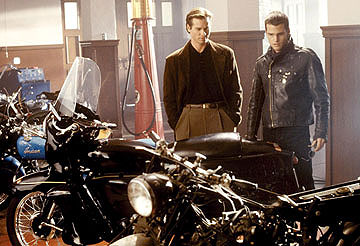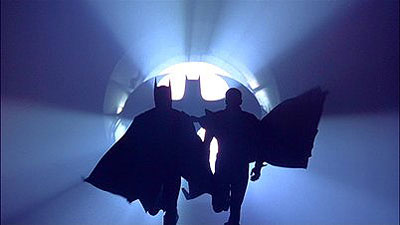Want To Start An Instant Argument? Let’s Talk About ’70s Fenders!
Published on December 5th, 2011 in: Dancing Ourselves Into The Tomb, Issues, Music, Over the Gadfly's Nest |By J Howell
In the exhaustive (and frankly exhausting) world of Internet forum guitar dorkery, few topics seem as sure-fire a heated debate-starter as the mere mention of Fender’s output in the halcyon days of the 1970s. To be fair, even in the mesozoic Internet days of the late ’90s, when I was working in a mostly-vintage-and-used guitar/hi-fi shop, plenty of—ahem—discussion was to be heard nearly any day of the week when it came to Fenders of that period.
(more…)
Arkham City: World Of Echo
Published on November 30th, 2011 in: Comics, Feminism, Game Reviews, Gaming, Movies, Over the Gadfly's Nest, Reviews, TV |By Paul Casey
Arkham City, released October 21, is an important Batman story. While perhaps not as unexpected as its predecessor, Arkham Asylum, Rocksteady have turned in a Batman game that builds on that one’s many successes. As someone who has been obsessed with Batman for a couple of decades, with changing degrees of intensity, Arkham City is literally a dream come true.
To have an interactive slab of Gotham City with such extremely detailed and well observed parts of Batman’s long history concealed for your own brand of detective work . . . well, it makes me feel both old and lucky to have been around this long. That the game is actually a wonderful, expertly paced, physical experience is something else entirely. As with Arkham Asylum, it still seems quite unusual to have a great comic book like Batman finally tap into why video games are such an exciting medium.
The SMiLE Meme
Published on November 29th, 2011 in: Music, Over the Gadfly's Nest |By Paul Casey

Smile logo
by Mark London
“SMiLE music is sacred. It is not to be messed with. Isn’t anything sacred anymore?”
—Sheriff John Stone
The Smile Sessions, released on November 1 from EMI and Capitol Records, marks in a significant way, the end for those who have centered their lives around the SMiLE Meme. The myth of the Perfect Album. The myth of the Lost Album. The myth of The Beach Boys (and their insecure fans) besting The Beatles (and their satisfied fans). While the reality of the music of SMiLE and the journey it went on is far more interesting to this writer’s ears, some continue to covet the picture in their head with fetishistic pride.
In Defense Of Television
Published on July 30th, 2011 in: Books, Editorial, Feminism, Issues, My Dream Is On The Screen, Over the Gadfly's Nest, TV |“There are only two things I love in this world: everybody, and television.”
—Kenneth the Page on 30 Rock“Now I am become death, the destroyer of worlds.”
—The Bhagavad Gita, as quoted by J. Robert Oppenheimer
TV is bad for you, right?
In Praise Of Joel Schumacher And BATMAN FOREVER, Part Two
Published on June 13th, 2011 in: Comics, Movies, Over the Gadfly's Nest |By Paul Casey
Since Christopher Nolan’s third Batman film, The Dark Knight Rises, has begun shooting, we thought it appropriate to revisit the frequently maligned Joel Schumacher film Batman Forever, which was released on June 16, 1995. Click here to read Part One.—Ed.

Joel Schumacher is obviously not the most well-read Batman fan ever. This is apparent from some of his befuddling mistakes in the commentary on the Batman Forever Special Edition DVD. He does however, apparently independent of “the rules,” have a very solid understanding of the appeal of the character:
I think the one unique thing that separates him from a lot of super-heroes is that he’s a man. He’s not a super force from another planet; green lasers don’t shoot out of his fingers. And he has all the vulnerabilities and all of the flaws and all of the human drama, that any human being has. He’s not perfect and he’s not impenetrable; he’s a man, not a superman.
In Praise Of Joel Schumacher And BATMAN FOREVER, Part One
Published on June 10th, 2011 in: Comics, Movies, Over the Gadfly's Nest |By Paul Casey
Since Christopher Nolan’s third Batman film, The Dark Knight Rises, has begun shooting, we thought it appropriate to revisit the frequently maligned Joel Schumacher film Batman Forever, which was released on June 16, 1995.—Ed.

First, a bit of background.
To many fans, Christopher Nolan’s work with the Batman franchise has served as a legitimization of the artistic worth of comic books. As both a comic book movie and also as a signifier of the depth of the character and the source material (from which the film’s subtleties originated), The Dark Knight laid down the gauntlet, setting the critical and financial standards by which every comic book movie will be judged in the future.
In Defense Of Elizabeth Gilbert
Published on March 30th, 2011 in: Back Off Man I'm A Feminist, Books, Culture Shock, Feminism, Issues, Over the Gadfly's Nest |By Lisa Anderson

Elizabeth Gilbert seems to be a rather divisive literary figure. Her 2006 memoir, Eat, Pray, Love told the story of the year she lived abroad after her first marriage ended. It spent almost two hundred weeks on the New York Times bestseller list, and was praised by Oprah Winfrey. At the same time, it received a lot of criticism in the blogosphere. The gist of the criticism is that many people have problems starker than Gilbert’s, that very few people have the resources to travel for a year as she did, a and that to use other countries as the backdrop for her personal salvation was imperialist at best, racist at worst.
I don’t think that any writer is above criticism, and I’m not trying to silence anyone. I certainly agree that racial and cultural sensitivity are important. However, a lot of what I’ve heard said about Gilbert misses the point of her work, and some critiques are quite sexist. I’d like to point out a few of the things that I’ve heard and explain why I don’t believe they apply.
(more…)
Top Ten Romantic Comedies: A Valentine’s Day List
Published on February 11th, 2011 in: Comedy, Holidays, LGBTQ, Listicles, Movies, Over the Gadfly's Nest, Staff Picks, Top Ten Lists |By Lisa Anderson

I Love You Phillip Morris
The romantic comedy: it’s the most reviled of genres, and yet also the most resilient. There’s an assumption that men only go see them out of obligation . . . although men are likely to enjoy the good ones, and women are likely to dislike the bad ones. Too many rom-coms rely on mutually insulting stereotypes (the commitment-phobic man, the miserable career woman), predictable plots (boy meets girl, boy does something stupid), and problematic supporting characters (Sassy Black Friend, Sassy Gay Friend).
Nevertheless, they keep getting made, and they keep making money. This is because among the scores of bad rom-coms, there are gems. Almost everyone can think of a few that have actually made them laugh, and managed to resonate with their feelings and experiences. Here are a few of mine, in no particular order.
(more…)
Letters To An R&B Contrarian, or: Why R. Kelly Matters
Published on February 11th, 2011 in: Music, Over the Gadfly's Nest, Teh Sex |By Paul Casey

Dear _____,
How are you? I was pleased to receive your last letter. I am glad that you are proceeding well with your descent into the mire of popular music and that you no longer scoff at the genre of R&B in such an ill conceived and self-satisfied manner. That you can acknowledge you were mistaken to hold that Keane album above “any R&B album of the last twenty years” is something.
Do You Want Trombone Or Do You Want The Truth?
Published on November 29th, 2010 in: Issues, Music, Over the Gadfly's Nest, Retrovirus, Three Of A Perfect Pair |By Jimmy Ether
In the documentary Kill Your Idols, Lydia Lunch expressed her frustration with the current music scene:
“The commodification and homogenization of especially bass, guitar, and drums is the downfall of music. Where’s the fucking tuba? A trombone! Anything but a bass, guitar, and drums!”
That seems an odd statement coming from someone who very successfully used those very instruments with Teenage Jesus and the Jerks to challenge rock conventions along side bands like D.N.A., Mars, and many of the other bands from the influential New York City No Wave scene. To a certain extent, she has a point.
(more…)

